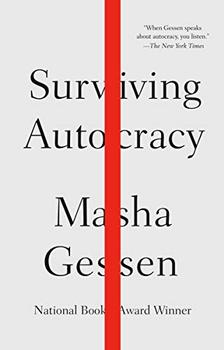Summary | Excerpt | Reviews | Beyond the Book | Readalikes | Genres & Themes | Author Bio

Critics' Opinion:
Readers' Opinion:
First Published:
Jun 2020, 272 pages
Paperback:
Jun 2021, 304 pages
 Book Reviewed by:
Book Reviewed by:
Lisa Butts
Buy This Book
But after the election, this reassurance rang hollow. Writing in The New York Review of Books on the day Obama celebrated the sun's rising as scheduled, I warned readers, "Institutions will not save you." I was drawing on my experience reporting on Russia, Hungary, and Israel—three countries that were very different from the United States, to be sure, but also different from one another. Their institutions had folded in remarkably similar ways. I couldn't know that American institutions would fail similarly, but I knew enough to say that absolute faith in institutions was misplaced. Many people shared this intuition. They were the more panicked camp. A common expectation took hold among them: the expectation of the Reichstag Fire.
The actual fire in the Reichstag—the German parliament building-burned on the evening of February 27, 1933. Adolf Hitler had been appointed chancellor four weeks earlier, and already he had begun placing restrictions on the press and expanding the powers of the police. But it is the fire, rather than Hitler's toxic first steps, that is remembered as the event after which things were never the same, in Germany or in the world. The day after the fire, the government issued a decree allowing the police to detain people without charges, on the grounds of prevention. Activists were rounded up by Hitler's paramilitary forces, the SA and the SS, and placed in camps. Less than a month later, the parliament passed an "enabling act," creating rule by decree and establishing a state of emergency that lasted as long as the Nazis were in power.
The Reichstag Fire was used to create a "state of exception," as Carl Schmitt, Hitler's favorite legal scholar, called it. In Schmitt's terms, a state of exception arises when an emergency, a singular event, shakes up the accepted order of things. This is when the sovereign steps forward and institutes new, extralegal rules. The emergency enables a quantum leap: Having amassed enough power to declare a state of exception, the sovereign then, by that declaration, acquires far greater, unchecked power. That is what makes the change irreversible, and the state of exception permanent.
Every galvanizing event of the past eighty years has been compared to the Reichstag Fire. On December 1, 1934, Sergei Kirov, the head of the Communist Party in Leningrad, was murdered by a lone gunman. The assassination is remembered as the pretext for creating a state of exception in Russia. Show trials and mass arrests followed, swelling the Gulag with people accused of being traitors, spies, and terrorist plotters. To handle the volume, the Kremlin created troikas—three-person panels that doled out a sentence without reviewing the case, much less hearing from the defense.
More recently, Vladimir Putin has relied on a succession of catastrophic events to create irreversible exceptions. In 1999, a series of apartment bombings in Moscow and cities in southern Russia killed hundreds. This allowed Putin to proclaim that he could summarily execute those deemed "terrorists"; it also became a pretext for a new war in Chechnya. In 2002, the three-day siege of a Moscow theater served as a demonstration of the principle of summary execution: Russian law enforcement pumped the theater full of sleeping gas, entered the building, and shot the hostage-takers as they lay unconscious. The Kremlin also used the theater siege as a pretext to ban the already cowed media from covering antiterrorist operations. Two years later, more than three hundred people, most of them children, died following an attack on a school in Beslan, in southern Russia. Putin used this catastrophic event to cancel the elections of local governors, effectively abolishing the country's federal structure.
The thinking that transforms tragedy into crackdown is not foreign to the United States. During the crisis that followed the Alien and Sedition Acts at the end of the eighteenth century, the ruling Federalists and the opposition Republicans accused each other of treason and a fatal lack of vigilance, of being Jacobin puppets. The courts, stacked with Federalist appointees, wasted no time shutting down opposition newspapers. Half a century later, President Abraham Lincoln suspended habeas corpus, the right not to be imprisoned without civilian judicial review. He did this to be able to indefinitely hold rebels whom he judged a danger to the Union—but whom, he said, "the courts, acting on ordinary rules, would discharge." It wasn't until 1866 that the Supreme Court ruled the practice unconstitutional.
Excerpted from Surviving Autocracy by Masha Gessen. Copyright © 2020 by Masha Gessen. Excerpted by permission of Riverhead Books. All rights reserved. No part of this excerpt may be reproduced or reprinted without permission in writing from the publisher.





The House on Biscayne Bay
by Chanel Cleeton
As death stalks a gothic mansion in Miami, the lives of two women intertwine as the past and present collide.

The Flower Sisters
by Michelle Collins Anderson
From the new Fannie Flagg of the Ozarks, a richly-woven story of family, forgiveness, and reinvention.

The Funeral Cryer by Wenyan Lu
Debut novelist Wenyan Lu brings us this witty yet profound story about one woman's midlife reawakening in contemporary rural China.
Your guide toexceptional books
BookBrowse seeks out and recommends the best in contemporary fiction and nonfiction—books that not only engage and entertain but also deepen our understanding of ourselves and the world around us.